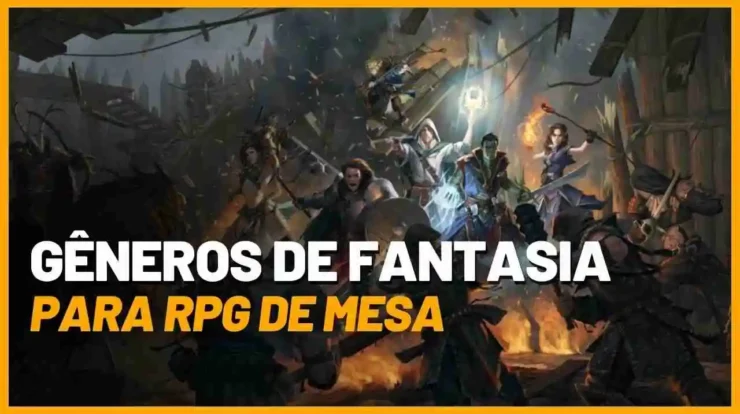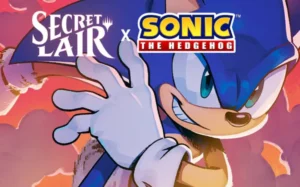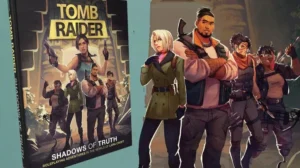
Fantasy Genres to Use in Tabletop RPGs
Surely you’ve heard about fantasy genres to use in your Tabletop RPG, or else your adventure, or even a one shot.
In this way, we will immerse ourselves in a fascinating universe and explore a variety of fantasy genres that go beyond the popular role-playing game Dungeons & Dragons (D&D).
Get ready to discover worlds full of magic, epic adventures and fantastic beings.
Let’s explore beyond D&D and break new ground in fantasy.
1. Epic: The Power of Greatness
First, epic fantasy then transports us to distant lands and envelops us in grandiose narratives.
In principle, in this genre, brave heroes face powerful villains in epic battles.
In this way, these stories are rich in detail, already presenting elaborate scenarios and, above all, a complex mythology.
Notable examples of this genre include “The Lord of the Rings” by JRR Tolkien and “A Song of Ice and Fire” by George RR Martin.
If you’re looking for an exciting journey full of dangers and challenges, epic fantasy is the perfect genre for you.
2. Urbana: The Encounter of the Supernatural with Modernity
Urban fantasy mixes magical elements and supernatural creatures as well as urban and contemporary environments.
In this genre, vampires, werewolves, witches and other fantastic creatures live secretly among humans in the shadows of cities.
The atmosphere is marked by mystery, suspense and a touch of magic.
Works like Jim Butcher’s “Dresden Files” and Cassandra Clare’s “Mortal Instruments” series are exciting examples of urban fantasy.
In these universes, readers immerse themselves in plots filled with supernatural intrigue and exciting adventures.
3. Scientific: The Fusion of Science and Magic
In science fantasy, science and magic intertwine in harmony, creating futuristic, technologically advanced worlds where mystical forces and magical beings coexist.
In this genre, we explore the border between technology and the supernatural, challenging the limits of imagination.
Works such as “The Amber Chronicles” by Roger Zelazny and the acclaimed “Saga” comic series by Brian K. Vaughan and Fiona Staples are shining examples of science fantasy.
In these stories, we are transported to fascinating realities, namely, where magic and technology come together in surprising ways.
4. History: The Past Reimagined
Historical fantasy mixes fantastical elements with real historical periods, thus offering an alternative view of history.
In this genre, historical events are reinvented with the addition of magical elements in addition to mythological creatures and legendary characters.
This unique approach allows us to delve into past eras from a new perspective.
Books such as Susanna Clarke’s “Jonathan Strange & Mr. Norrell” and Diana Gabaldon’s famous “Outlander” series masterfully exemplify historical fantasy.
These works transport readers to historical moments filled with magic and captivating adventures.
5. Steampunk: The Victorian Age with Magic Gears
Steampunk fantasy combines elements of the Victorian era with steam-powered technology and fantasy elements.
In this genre, we find scenarios full of complex machines, airships in the sky and a retrofuturistic aesthetic.
Magic and mystical power are built into gears and technological devices.
Works such as “Leviathan”, by Scott Westerfeld, and “The Mechanical War of the Worlds”, by Jay Lake, are outstanding examples of steampunk fantasy.
In these narratives, we are transported to a world where science and magic merge in an intriguing way, ultimately providing a unique experience.
6. Mythological: The Magic of the Gods and Ancient Creatures
Mythological fantasy dives into the rich mythologies and stories of ancient gods and creatures.
Therefore, in this genre, we explore divine pantheons, mythological beings and epic adventures set in time immemorial.
These stories transport us to a universe where mythology comes to life.
Works such as Rick Riordan’s “Percy Jackson and the Olympians” and Neil Gaiman’s “American Gods” are fascinating examples of mythological fantasy.
In these sagas, readers are introduced to ancient gods, as well as legendary heroes and extraordinary journeys that intertwine with the myths and legends of the past.
7. Romance: Love and Magic
By nature, romance movies and literature focus on relationships and personal growth rather than action and adventure.
However, incorporating great romance tropes can be useful for Dungeons & Dragons.
The romance genre can play a role in the roleplaying, but on the other hand it can define the overall plot of the quest.
Many Arthurian stories are based on a central love story, often forbidden love with serious consequences.
Perhaps a passionate paladin NPC yearns for the princess, and players can help him reunite with her and fight the king’s guards.
In short, whatever the case, a well-crafted novel is sure to keep players engaged.
8. Heist: Chase and treasure
Heist movies, or caper movies, are popular.
They depict a team of clever heroes or anti-heroes who hatch a cunning plan to steal something.
However, the plan will inevitably hit a snag when something goes wrong, leading to some action.
Inception and The Usual Suspects are good examples of this.
This way in a Dungeons & Dragons campaign adds some serious fantasy flair to the heist genre, even if the party isn’t quite composed entirely of sticky-fingered thugs.
This game features all kinds of cool treasures that an evil king or lich might be hiding behind magical traps.
Players can get hints not only from heist movies, but also from the book Keys to the Golden Vault.
9. Fantastic Western: The Frontier Between Magic and the Wild West
The fantastic western is a genre that combines elements of the western with magic and fantasy.
So, in this unique fusion, we explore Wild West settings infused with supernatural and mystical elements.
Shamans, gunslingers with magical powers and fantastic creatures inhabit these wild lands, creating stories full of action and mystery.
Works such as “The Dark Tower”, by Stephen King, and the film “No Country for Old Men” explore the fantastic western in an exceptional way.
In these narratives, we are transported to a universe of bloody duels, hidden secrets and a unique blend of magic and adventure in the Wild West setting.
10. Espionage: The Art of Deception
Spy stories have a long and illustrious history.
The lavish aesthetics, dangerous missions, and eloquent expertise of the spies in the stories have made the genre a staple of popular culture for hundreds of years.
So, since stealth and subterfuge are the bread and butter of a spy, a Dungeons & Dragons game in which the player characters are spies would then require an expansion of the existing stealth mechanics.
At times, your ability to move unnoticed in safe spaces would need to be given more weight, leaving direct combat as a last resort.
Fantasy Genres to Use in Tabletop RPGs

In short, each of these genres offers a unique experience, transporting us to fascinating worlds full of adventure.
Whether it’s epic fantasy, urban fantasy, science fantasy, historical fantasy or western fantasy, there’s something for every fantasy enthusiast.
So take this opportunity to explore these genres and immerse yourself in engaging stories.
Let your imagination soar as you discover new universes, captivating characters and exciting plots.
In that sense, fantasy beyond D&D is full of surprises and wonders, waiting to be explored.
So don’t miss the chance to venture into new horizons and experience the magic of these fantasy genres to use in your Tabletop RPG.
Source: https://www.caixinhaquantica.com.br/generos-de-fantasia-para-usar-no-rpg-de-mesa/


